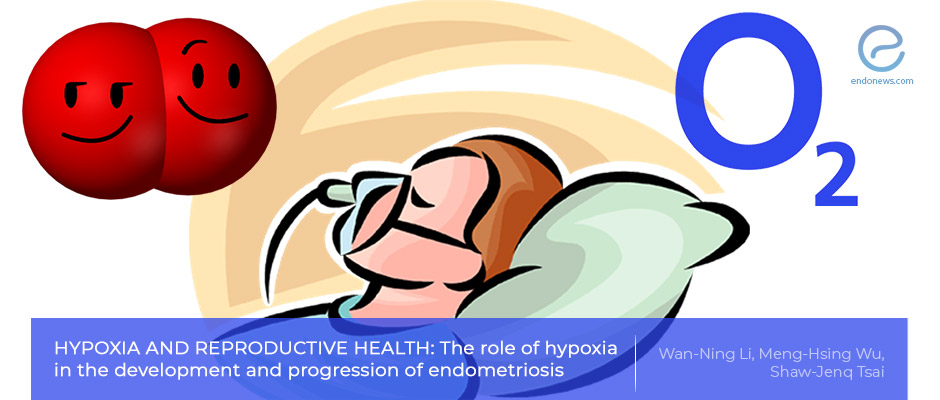Oxygen deprivation (hypoxia) has a critical role in the pathogenesis and progression of endometriosis
Mar 10, 2021
Hypoxia causes adverse mechanisms at the molecular level, facilitating endometriosis
Key Points
Importance:
- It is possible that cells in endometriotic lesions undergo changes through unknown mechanisms under hypoxic stress showing ability for continuous development.
- There is solid evidence that hypoxia plays an important role in the clinical outcome of endometriosis "enigma".
What's done here?
- In this review paper, scientific evidence that points to the effects of hypoxic cellular environment in the pathogenesis and progression of endometriosis growth are presented in detail.
Importance
- Hypoxic conditions are potent regulators of endometriosis and so by blocking the hypoxic milieu an ideal therapeutic achievement could be attained relevant to disease prevention and progression.
- Attempts at targeting the hypoxia-mediated gene regulation in clinical circumstances could yield possible therapeutic interventions in the future.
Key Results
- An important number of genes taking part in pathogenesis of endometriosis seem to be directly regulated at the transcriptional level.
- Hypoxia may be effective on certain genes indirectly through epigenetic interactions like DNA methylation, histone modification, or post-transcriptional mRNA unsteadiness.
- Hypoxia causes adhesive, migratory, anti-apoptotic ability in early development of endometriosis.
- Dysfunction in phagocytosis and macrophage polarization prepare the base for immune privilege of endometriotic cells.
- Angiogenesis and proliferation caused by hypoxia are the main issues during the disease progression.
Lay Summary
Dr. Wan-Ning Li and associates from academic institutions from Taiwan have published their review paper on the role of hypoxia and possible therapeutic outcomes in the medical journal named "Reproduction" recently.
Endometriosis is an important ailment with huge medical and social impact that remains elusive in regard to its pathogenesis. The development of endometriosis seems to be related to the interactions of multiple gene–gene and gene–microenvironmental factors. Hypoxia-inducible factors (HIFs), a group of heterodimeric molecules with α and β subunits, are transcriptional factors regulating expression of target genes under oxygen deprivation. Via this mediating gene expression, oxygen deprivation affects the important processes like cell division, angiogenesis, apoptosis, immunologic interactions besides metastasis as well as drug resistance. This review paper discusses the regulatory role of oxygen deprivation in the pathogenesis of development and the progression of endometriotic lesions.
Oxygen deprivation results in a stressed cellular environment regulating the expression of an important number of genes involved in disease mechanisms. Mushrooming scientific discoveries show that hypoxia has a vital role in yielding pathologic manifestations of endometriosis, such as adhesions, dysregulation of estrogen milieu, aberrant proinflammatory cytokines, increased angiogenesis, and immune suppression.
Oxygen deprivation operates also through epigenetic regulation such as DNA methylation, histone modification, or miRNA-mediated post-transcriptional mRNA destabilization. Currently the clinical choices in the treatment of endometriosis have been mainly on surgery and/or hormonal medication. The high failure rate besides potential complications continuously yield problems in patient care. Endometriosis is a disorder of complex pathogenesis and based on novel findings on detrimental effects of oxygen deprivations so far, it is believed that hypoxia strongly modulates the pathological processes in endometriosis. Targeting the hypoxia-mediated gene regulation as an adjunct treatment may be a promising strategy for the future.
Research Source: https://pubmed.ncbi.nlm.nih.gov/33112784/
hypoxia endometriosis therapeutic horizons adhesion angiogenesis migration apoptosis autophagy phagocytosis macrophage

